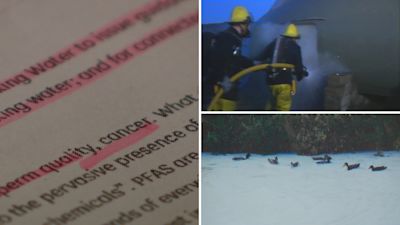Jersey health officials meet residents concerned over PFAS-linked conditions

ITV Channel's Philip Sime gauges the reaction to a second report on the health effects of a toxic chemical leaked into Jersey water sources in the 1990s
Broadcast on Wednesday 27 November
Jersey government has shared new findings from a report that's attributed a long-lasting chemical called PFAS as a possible cause of certain types of cancer and other conditions.
However, the data remains inconclusive despite some insisting that it has contributed to life-changing illnesses.
It's the second report from the PFAS Scientific Advisory Panel into the effects of the chemical on people's health, released at a public meeting on Tuesday 26 November.
Campaigners hope this is a step towards understanding the health effects of PFAS after the chemical made its way into private Jersey bore-holes in the 1990s.
Jeremy Snowdon says: "The last 10 to 20 years, I've just felt as if I'm banging my head against a brick wall, trying to get things done, and at last we see the first glimmer of something happening."
PFAS is a long-lasting chemical that can be found globally, with scientists still piecing together what effects it can have on people's health.
In 1991, PFAS was used in fire-fighting foams at Jersey Airport for training, which leaked into private bore-hole water supplies.
In 2022, blood tests from 88 people who lived close to the airport found 'higher than expected' levels of PFAS in their systems.
Graeme Farmer took part in the testing program and was later diagnosed with blood cancer.
He believes drinking water in the area around the airport has caused his condition, but there is currently no scientific evidence to prove this.
Graeme explains: "There is no cure for what I have. Hopefully, they can maintain it and hopefully, I'll be an old man, but you can never know what is around the corner. So that is a constant worry."
Professor Peter Bradley, Jersey's Director of Public Health, attended the public meeting and reassured islanders that the report shows no increased risk factors for islanders.
He explains: "The international literature does show that if you are exposed to PFAS at a reasonable level, we need to think about some specific conditions which may impact your health.
"But at the moment, islanders can be reassured that there is no elevated risk because of this report. We've just collected what is known internationally at this stage."
The Government says Jersey's water meets European standards - and that it wants to further improve water quality over time while doing whatever it takes to resolve the issue for affected residents.
Want a quick and expert briefing on the biggest news stories? Listen to our latest podcasts to find out What You Need To Know...